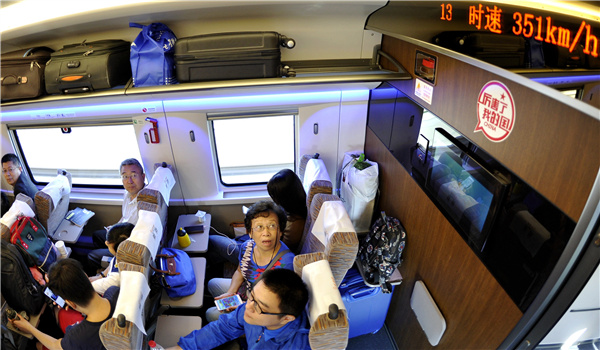Breakthroughs confirm China's rise as a global high-tech player
China Daily,October 20, 2017 Adjust font size:
Online shopping
For example, online shopping is now the norm for hundreds of millions of Chinese consumers. The advent of e-commerce, online payment and courier services means consumers can have goods delivered to their doorsteps within hours with just a few taps on their mobile gadgets.

The 20th Beidou navigation satellite was launched in September 2015 in Xichang, Sichuan province. The homegrown Beidou Navigation Satellite System is set to cover the world by 2020. [Photo/Xinhua]
In the past five years, China's online retail market has surged from 1.3 trillion yuan ($196.5 billion) to 5.2 trillion yuan, raising living standards in both big cities and villages, according to a report released this month by Alibaba's research unit.
Juggernauts such as Alibaba and JD.com have lured shoppers through the use of annual discount shopping galas that could eventually eclipse Black Friday in the US.
Moreover, smaller players are pushing ahead with the digital shopping frenzy by connecting a larger number of affluent Chinese with a wide array of foreign goods, while companies such as Red and Kaola, which is owned by NetEase, are heavily promoting cross-border e-commerce.
Market researcher eMarketer estimates that by 2020, half of China's digital shoppers-about one-quarter of the country's population of 1.4 billion-will be buying foreign products online and total sales will top $157 billion.
Likewise, the country's mobile payment industry has made its mark in the outside world by moving away from its original function of simply facilitating transactions and embracing new activities such as wealth management, credit scoring and utility bill payments.
Girish Ramachandran, Asia-Pacific president of Tata Consultancy Services, India's largest information technology company, said China's rapid strides in digital technologies and innovation capability have indirectly inspired India to digitize its economy.
For example, Ant Financial Services, the owner of China's largest mobile payment service, has brought its wireless payment solutions to its Indian counterpart Paytm.com, and the two signed an agreement in 2015 to create a local version of Alipay.
Zhang Wentao, a college student in Beijing, is typical of the younger generation, which has grown up in the midst of China's tech revolution: "When I go out, I don't bother to take a wallet. A smartphone is all I need to buy almost everything I need."

The Fuxing fleet of bullet trains, which runs 350 kilometer per hour, was put into service on the Beijing-Shanghai high-speed rail line in September. [Photo/Xinhua]